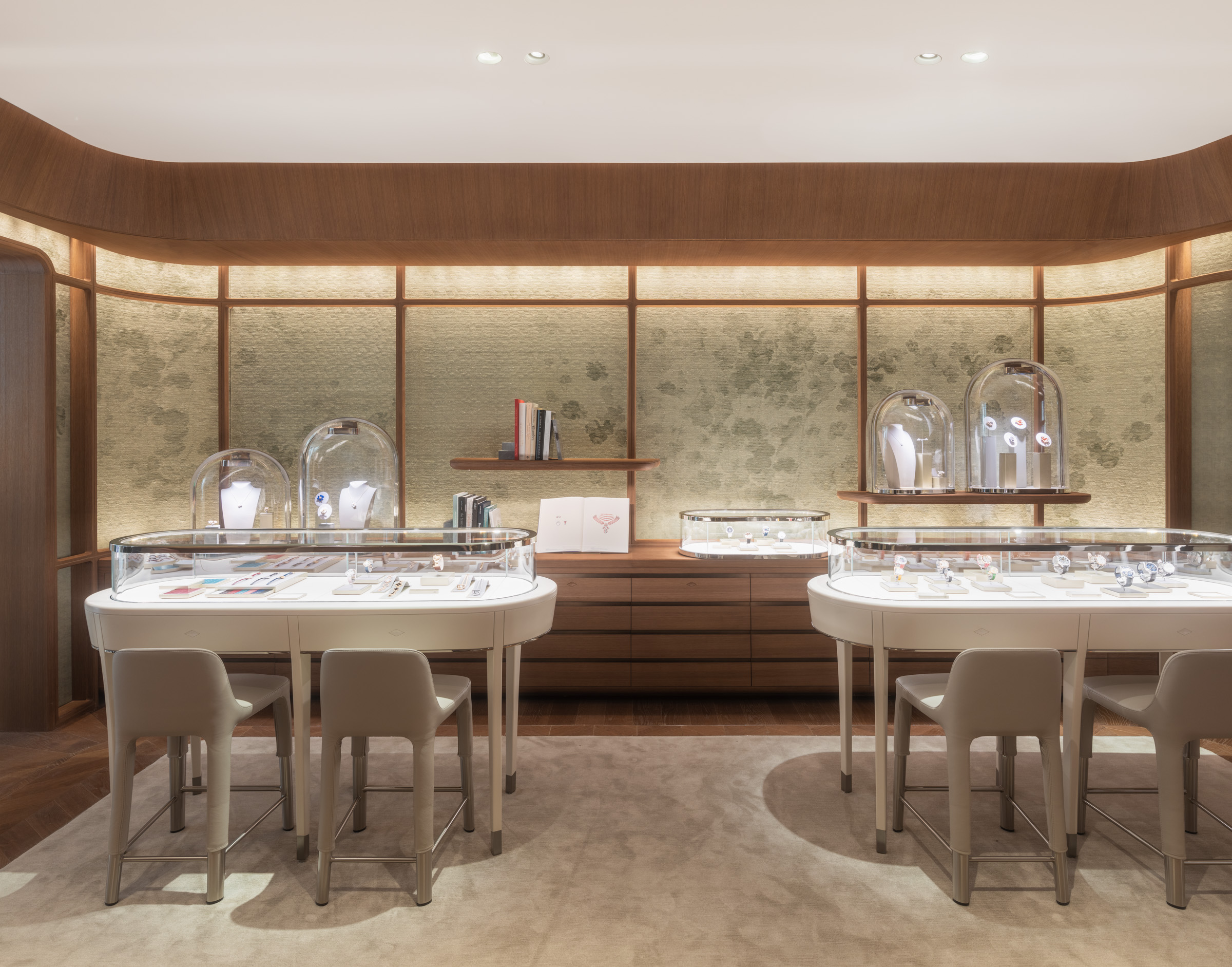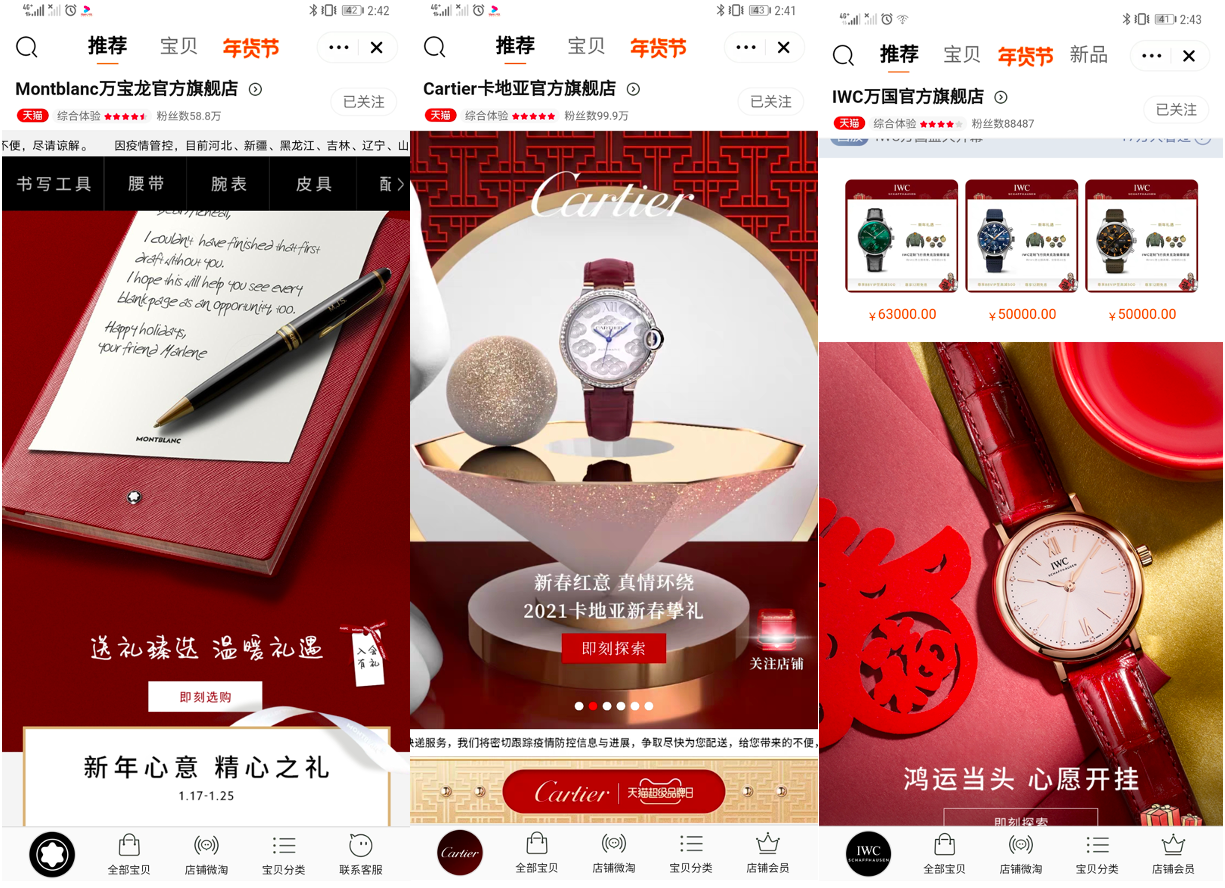
Covid-19 has accelerated the pace of digital transformation at Swiss luxury group Richemont, which is turning its focus towards creating new, sophisticated online shopping experiences for its customers.
China has become a showcase for the Geneva-based group’s online offerings. It is Richemont’s biggest and fastest-growing market. And for the overall luxury sector, China is expected to account for half of global sales by 2025.
Richemont, which owns Cartier, Montblanc, Chloé and Yoox Net-a-Porter, recently announced that it would explore opportunities to ramp up seamless, cutting-edge omnichannel experiences for high-end shoppers. Many of its businesses have also been the first to experiment with the newest digital engagement tools on Tmall Luxury Pavilion, Alibaba’s dedicated platform for high-end goods – from curated virtual trade shows and livestreaming to 3D and virtual reality-enabled technologies.
We spoke with CEO Jérôme Lambert to understand Richemont’s vision of new luxury retail and get his take on the Alibaba partnership, insight into luxury consumer behavior in China and how the coronavirus pandemic could forever change the industry.
This interview has been edited for length and clarity.

Tell us about your partnership with Alibaba, and how has it evolved?
Alibaba is the preferred online shopping destination in China today, and Richemont – with nearly 30 years of retail presence in the market – can claim to be one of the leaders in “hard luxury,” namely jewelry and watches. We have always admired the innovative and creative business approach of Alibaba. Through our conversations, we also saw a real passion and interest in our businesses and their capabilities to develop qualitative relationships with our clients. Our active collaboration started with our joint venture, aimed at developing the Net-a-Porter and Mr Porter’s business in China. We signed the JV contract last July and officially launched Net-a-Porter’s flagship store on Tmall Luxury Pavilion in September, just ahead of the 11.11 shopping festival.
The success we have seen has proven the value of Tmall Luxury Pavilion in extending the presence of our businesses in China, including Cartier, Montblanc, Piaget, IWC Schaffhausen and Jaeger-LeCoultre. We launched nine houses on the platform in the last calendar year, which speaks volumes about our strong willingness to grow quickly and scale our collaboration.
What are the keys to staying agile, innovative and creative for a big company like Richemont?
We don’t see innovation and patrimony as contradictory. Innovation has the power to enhance what we do, from bringing a product to market to communicating our heritage and craftsmanship. China is a strong source of our motivation to be extremely innovative because of the Chinese consumers’ strong appetite for new experiences. This curiosity and capability to adapt constantly raise the bar for us. In China, innovative features can be quickly developed and tested in the market, also at a large scale. This is truly unique in today’s world.
For example, we first experimented with livestreaming – which is a different way of presenting to and interacting with our clients – in China, then we explored how to develop it further. The same goes for our “omnistock” initiative to optimize the global inventory, which was first tested in China and expanded elsewhere. So there is a double dimension: remaining active is a necessity in the market, while there are unique opportunities and resources that allow us to test new ideas in a very short period of time.

So these push-and-pull factors in the market keep you agile. How has Richemont been able to innovate by working with Tmall Luxury Pavilion in particular?
We had a very successful run last year around the Watches & Wonders trade fair. Traditionally, we hold a major exhibition in Geneva each spring to present and spread the word about our new products. That was not possible last year because of Covid, and we had less than six weeks to find a plan B. That prompted us to create a digital showcase using technologies, such as livestreaming. It was the first virtual luxury event of its kind within Tmall and reached more than 350 million impressions. Creating this show would have been impossible without the help of Alibaba, as their speed and reactiveness were instrumental to our success.
In September, we launched a similar online experience for another edition of Watches & Wonders, in addition to a physical exhibition in Shanghai. The digital and physical events complemented each other and gave the event visibility and resonance like never before. For the coming edition, we expect more than 50% of luxury watch players to be exhibited in the digital presentation. This is huge in terms of its impact. We are going from zero to half of the players to be presented online only after two editions.
Speaking of omnichannel experience, what is Richemont’s strategy with customer experience in the digital age? How do your digital and physical channels work together?
For all our campaigns on Tmall Luxury Pavilion, we consider how our digital funnel and physical functionalities – from our call centers to in-store pick-up service – can be integrated. And we are exploring new ways to create a complete fusion between the physical and digital. For example, we are looking into launching Tmall Flagship 2.0‘s Light Store feature for one of our businesses, which will give its brick-and-mortar retail network an online presence.
We also want to make greater use of ecosystem resources within the Alibaba Business Operating System, which offers a fantastic opportunity to elevate omnichannel experiences for our clients. Also, TimeVallée (Richemont’s innovative multibrand watch retail concept open to all high-end watchmakers) has signed a partnership with Intime, Alibaba’s department store chain. This provides access to Intime’s physical and mobile shelf space and offers an excellent experience to more consumers, both online and offline.
Tmall Luxury Pavilion: 2020 In Review
All Richemont businesses on Tmall Luxury Pavilion participated in last year’s 11.11 Global Shopping Festival. It was also the first 11.11 for many of them, including Cartier, Vacheron Constantin, Panerai and Montblanc. Why was it important to participate in the event?
The Global Shopping Festival was an important opportunity to converge the physical and digital dimensions in new ways. The event wasn’t purely digital, as we also gave it visibility across our retail stores. Our clients now expect to be able to interact with brands anywhere, anytime and on any device – and this expectation has been raised to an unprecedented level by the pandemic. So we are seeing more and more multitasking experiences, such as people shopping in a physical store while browsing products on their mobile phones and watching a livestream at the same time. Consumers are not willing to lose these multiple dimensions, so we have gone from one channel to multichannel, then to entering a New Retail world where there is a fusion of the physical and digital. Making these different experiences possible for our clients has been very rewarding.
How are luxury shoppers in China unique or different from consumers elsewhere?
Chinese clients are sophisticated and increasingly demanding, which is why some of the best experiences today are first introduced in China, as is the case for many of our businesses. Clients in China are very tech-savvy and open to new technologies, which is why we constantly elevate our level of interaction. They are also younger than the rest of the world, which has made it necessary for us to adapt our communication tools and approach to the specificities of a younger generation.
Again, all of this factor into our strong motivation to work with Alibaba and constantly modernize the interaction we have with the clients. With Alibaba, we have experienced a kind of time contraction. If we used to take 12 months to bring a new experience, now we are able to condense that into just one month because of the intensity and the scale of the network that Alibaba offers. We are seeing an acceleration and amplification of experience. That is why I say working with Alibaba helps to condense time: it has significantly reduced the time we need to create new experiences and enhanced our capability to learn from them.
Some luxury brands might find that daunting or fear they would lose a sense of exclusivity and control.
I think the stronger your DNA, the stronger your capability of knowing who you are and what you want to express. If you have a very strong DNA and differentiated expression, then the exposure enhances and propels your business. Just like DNA, our businesses are constantly evolving and creating new expressions of their respective heritage. This shows how being more open and connected is a fantastic way to help invent the world of tomorrow.

What are some other takeaways from China that surprised you?
Working with Alibaba revealed the immense possibilities beyond tier-one and tier-two cities. We always presumed that relying on brick-and-mortar was limiting consumers’ access to our businesses, and the partnership helped confirm a good amount of interest and opportunities in tier-three and tier-four cities as well. We are also seeing digital enhancing iconic products. As we move further down the funnel of digital communication, there is a lot of interest concentrated on icons. It’s a reinforcement of the importance of the icons.
Icons are the brands’ classic staples?
Yes, it’s exactly that. Iconic products, such as the Pilot or the Portuguese from IWC or the Marcie bag from Chloé or Van Cleef & Arpels’ Alhambra collection. It can also be the iconic codes of the luxury house, for example, the signature colors, typography, style of expression or the sense of aesthetic, for example, the sophisticated aesthetic expression of Vacheron Constantin timepieces. These elements have become even more important in the digital space.
How Piaget Adds Sparkle to Luxury Shopping Online
How has the pandemic impacted the industry and your business?
It has strongly heightened the level of interaction between brands and end consumers. Interaction used to be largely focused on physical shops, but not anymore. Clients decide when they get to learn about and interact with a brand, and how and when they want to pay. It’s a new chain of interaction that requires our teams to embrace agility and new capabilities. It is like you had always played in the same position in a rugby team and, suddenly, you have to be able to move from forward to the line, or to fullback. It is a new way of working and has allowed us to experiment and learn new things.
What is your outlook on the market as we continue to see the luxury sector rebounding in China? What’s next for Richemont?
At Richemont, we have historically paid a lot of attention to the “local” as opposed to global. The local dimension has now taken on even greater relevance in China because of the pandemic. Our aim is to focus even more on local and to elevate the experience for clients within China. We already have fantastic points of sale and points of contact and communication, supported by Alibaba’s technologies and our omnistock system.
There are also a lot of exciting new projects underway. This festive season was the first time that so many of our clients stayed in the country instead of traveling overseas. Feng Mao also continues to develop amazing, multibrand experiences on Tmall Luxury Pavilion, and we look forward to launching new omnichannel customer experiences in China in 2021.




